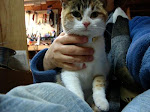Devoted reader (or two), you may or may not know that Mr. Fuzzy's favorite art movement of all times was the Arts & Crafts Movement, alternatively called American Craftsman Movement in America.
It began in England spurred on by the luminary figure, William Morris, aided and abetted by the writings of John Ruskin. Morris began it in 1860 but it was not well recognized until perhaps 1880. Its tenants began to spread worldwide and by 1897, it had a firm foothold in America and Canada. It was promoted by numerous magazines in Britain, Europe and America; the most noted in America was easily Gustav Stickley's The Craftsman. Stickley was a design genius; "mission furniture style" is a modern misnomer for his main development but he also designed homes (plans were sold by mail). Mr. Fuzzy once marveled at a neighborhood in Tacoma, Washington, where about every fourth home was a Stickley design.
Unlike any prior art philosophy/movement, fully half of the artisans were women, the philosophy was accepted widely and it promoted the need for art among all classes, not just the richest.
Stickley wrote in the January, 1911, issue of The Craftsman:
The reason why I believe that the country is such a fine training-school for character and experience, is because farm work, as compared to the routine and one-sidedness of office work, offers to the boy the best possible opportunities for the development of self-reliance, of initiative and the creative faculty... In the business life of our cities, the city man who begins as a clerk rarely goes much further; he may be promoted to some higher position on the department in which he started but the career usually ends in the grove in which it began. Young people who enter routine occupations with no other experience back of them have no equipment for anything else, and they are apt to have little capacity for meeting new problems and forging ahead. Whereas the boy who has been brought up on an American farm and who has been trained in all the variety of experience that makes up farm life has acquired independence, ingenuity and the ability to think for himself. Every day on a farm brings some new problem that has to be met and solved. I have so often said, contact with Nature gives us a certain breadth of vision on which depends our capacity for further development. We cannot go forward beyond the limit of our vision. A mind crushed by dull detail of routine labor and a physique depleted by unwholesome indoor occupation cannot lift a man out of the narrow sphere of drudgery. But a mind lit by the vision of a larger purpose in daily work and of something greater beyond that, a body vibrant with health and ready for action --- these make a man, while loyal to his work, at the same time independent of it, because his thought and his capability are larger than the routine of the occupation.
Subscribe to:
Post Comments (Atom)





No comments:
Post a Comment